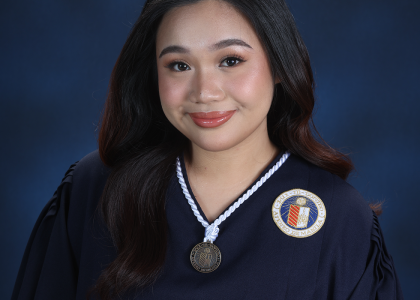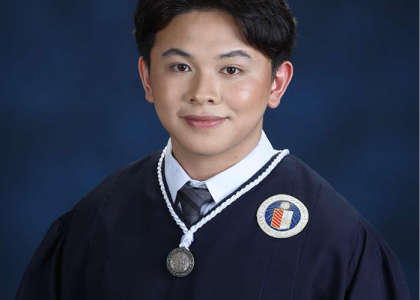
Good morning everyone!
We were down to two. After graduation, I made it to the final two candidates for a management training position at Insular Life, the largest insurance company then owned by Ayala Corporation. It was a much coveted fast track to a managerial role, promising a guaranteed manager position after just two years of intensive training. The final hurdle, after several one on one interviews, was an interview by a panel of very senior officers of the company. I sat nervously in a huge and very cold boardroom, with imposing wood panels, a large conference table and a dozen black leather armchairs.
Across me were no less intimidating: 5 distinguished and oldish and very formal looking gentlemen all dressed in dark suits. This was in May 1975, a month after graduation- I was very nervous, but hopeful. I was asked to open a wooden box in front of me, pick an index card, read, and answer, the question. The question was “what makes a good manager?” My answer was quick, “brains and guts” and I explained my reasoning.
I thought I was doing well, until one of them, his name I can never forget, Mr Felipe Enage, the long standing human resources head of the Ayala Group, interrupted me. “What about the heart, Mr Sebastian?” Well, mine sank to the floor. I realized I had overlooked something essential – the importance of the heart, of empathy and care. I was served an early lesson in work and business, as well as life. It was a painful lesson but one that stayed with me throughout my career, and indeed in my life. I had no excuse. In retrospect, I missed what Jesuit education is all about: it is not just about academic excellence or technical expertise but about nurturing the intellectual, emotional and spiritual growth of each individual.
Ever wonder why we take subjects like literature, theology, philosophy and social sciences? Today, any good manager or professional will tell you that while IQ is important, EQ or emotional quotient – the heart – matters just as much, if not more as you move up the food chain. Mr Enage was right after all, and from that day on, I took to heart (forgive the pun) what my Jesuit education had taught me: cura personalis or care for the whole person.
Not all is lost though. My resume was circulated to other Ayala companies, and after two weeks, though it felt much longer, I was hired as a research analyst at Ayala Investment Development Corporation, the Group’s investment bank. There, I was surrounded by colleagues with extraordinary technical skills, especially in accounting and finance. Almost all were certified public accountants, and graduated cum laude, magna and summa. AIDC after all was the primest and most prestigious investment bank then along with an outfit called Bancom, headed by Mr Sixto K Roxas, our commencement speaker in 1975 I remember fondly. I quickly realized I had serious catching up to do, having taken just Basic Accounting 101 in college.
Drawing on the Jesuit lesson of self awareness, I committed myself to self study. Within two years, hard work paid off, and my liberal arts education, as well as communication skills, helped me stand out. In 1977, I was appointed to an expatriate position at our Hong Kong subsidiary. In our line of business which is investment banking, half the job is thinking and analysis, the other half is talking and communicating. It is not a minor detail of course that I was personally chosen by the head of the HK office, an Ateneo graduate also from a blue blooded family, Mr Toto Cruz, the nephew of our university president then, Fr Joe Cruz, and a descendant of Jose Rizal, an alumnus himself as we all know. Toto Cruz is my second mentor (after the research head who first hired me) and has become a life long friend.
My top of the world years as a young bachelor expatriate didn’t last long. In 1984, after 7 years, I lost my job due to the debt moratorium under Marcos Senior when the Philippines couldn’t pay our foreign debts. All Philippine investment banks in Hong Kong closed down or turned into remittance offices.
For months, I agonized, struggled to find work in HK or back home. Finding no employment opportunities, with the support of another Ateneo graduate and now life long friend Mr Boyboy Reyes, I boldly, (you don’t think very hard at 30 years old, and I had no choice anyway), I started a financial consulting and business services operations in HK. Thanks to the Jesuits’ teachings on self reflection, I was again acutely aware of how little I knew about running a business. I felt inadequate and short of not just experience but general business knowledge.
My education in Economics, and one semester in Ateneo part time MBA before I left for HK, had not fully prepared me for entrepreneurship. Literature, theology, philosophy won’t take you far in setting up, building and running a business by yourself. So I turned to self study. I bought a book entitled “What books they read in Harvard MBA” and with much time in my hands working alone most of the time, I devoured books by Peter Drucker, Michael Porter, Alfred Sloan and many others. I also attended part time courses, both technical, like trade finance and foreign exchange, as well as self improvement ones like time management, Stephen Covey’s Seven Habits and so on.
Through this personal journey, running my own business and developing my management team, the Jesuit spirit of “MAGIS” came alive: sometimes through books like “In Search of Excellence” by Tom Peters, or the now well known Japanese practice of “kaizen” or continuous improvement.
After 13 years of running my own firm, Mr George Ty the founder of Metrobank invited me to head their investment bank, First Metro Investment Corporation. Suddenly, I was at the center of Philippine investment banking during some of the country’s most turbulent years post the 1997 Asian Financial Crisis. But it was probably one, if not the most meaningful period of my professional life.
As President of FMIC from 1997 to 2012 and later its Chairman, we transformed FMIC into the largest and leading investment bank, truly a prime mover of the Philippine capital markets. But beyond financial success and industry prestige, what mattered most was our contribution to the Philippine economy mobilizing funds for government and industry, pioneering retail treasury bonds for the national government and long term peso funding for much needed infrastructure projects.
We also made direct investments like insurance (AXA Philippines), leasing (Orix Metro Leasing), and securities brokerage and believe or not, even investing and operating the largest power plants in the Visayas that averted a regional power crisis in the year 2007. Through these years of challenges, two principles of Jesuit education stood out and resonated well: continuous learning which helped us both in entrepreneurship and investment banking and love of country, the nobility, the higher purpose of the work we do.
As a proud scholar, I am deeply grateful for the transformative Jesuit education that has shaped my life. And with parents who were public school teachers, this education was made possible by the support of generous donors like you. I graduated Valedictorian in a public elementary school in our barrio in Bulacan where my father was the principal, my mother a teacher along with two aunties. Ahh, of course, these are minor details. I managed to get into San Beda for high school on full scholarship. It is not a bad school either. Again, a minor detail.
To my fellow scholars, the lessons you learned in this university may not reveal their value immediately. Like me, you may even forget them in a job interview as soon as you step out of school. But there will come a time – perhaps in moments of challenge or triumph, times of failure or success, when you will realize, and truly embrace, the unique formation you have received, freely if may quickly add!
And to our donors, present and future, your sponsorship is more than a gift, or a financial support. It is an investment in hope and opportunity, planting seeds that will one day blossom into leaders who will shape a better world.
One last lesson for all of us: whatever we do, whatever we achieve, LET US NOT FORGET, LET US ALWAYS REMEMBER, they are: AD MAJOREM DEI GLORIAM.
Mabuhay kayong lahat at magandang umaga!




